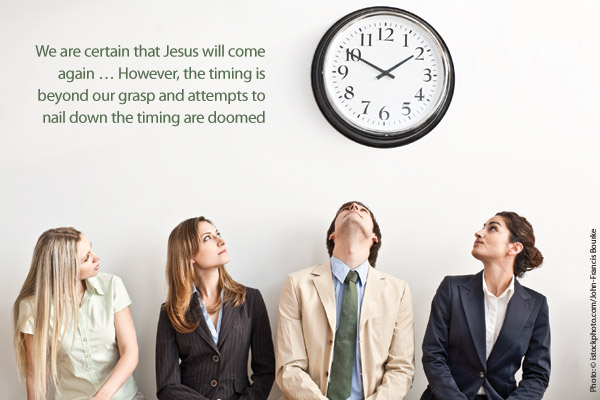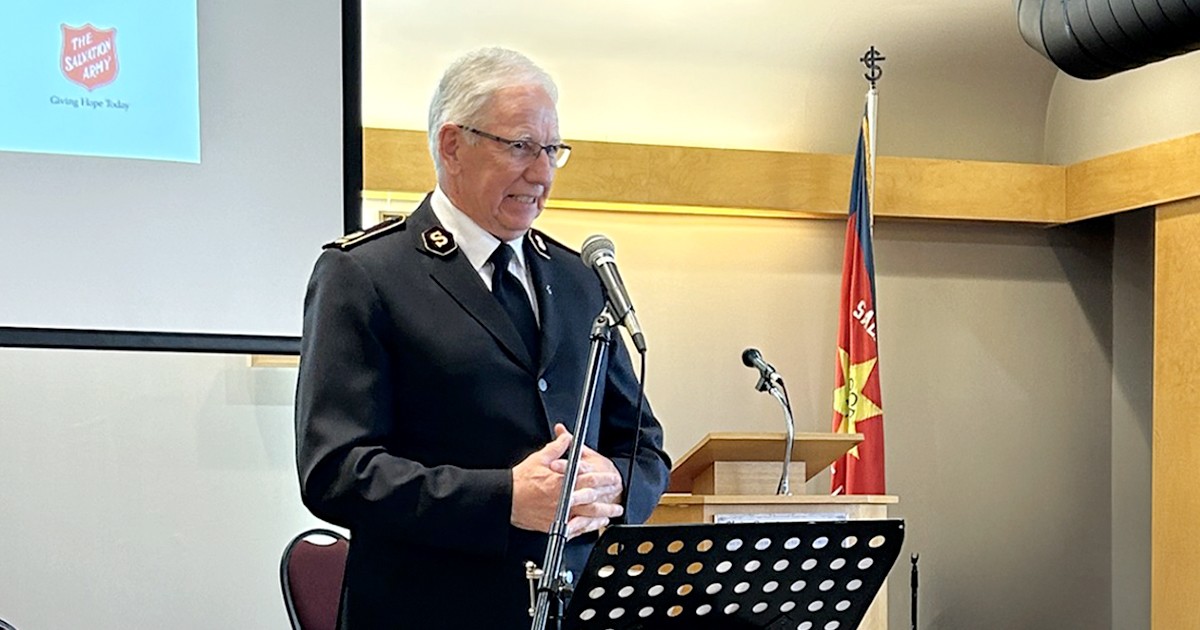 Recent predictions of the imminent return of Jesus—especially those of American preacher Harold Camping—have stimulated both the fascination and the ridicule of many as we wait to see whether Jesus returns and the world comes to an end on schedule. The fact that so many previous predictions of the Second Coming have proved false calls into question both the nature and the dependability of Christian hope. What do Christians hope for? Is our hope well-grounded or simply wishful thinking? To answer these questions, we must explore the nature and basis of our Christian faith.
Recent predictions of the imminent return of Jesus—especially those of American preacher Harold Camping—have stimulated both the fascination and the ridicule of many as we wait to see whether Jesus returns and the world comes to an end on schedule. The fact that so many previous predictions of the Second Coming have proved false calls into question both the nature and the dependability of Christian hope. What do Christians hope for? Is our hope well-grounded or simply wishful thinking? To answer these questions, we must explore the nature and basis of our Christian faith.
The Now and the Not Yet
Christian hope is grounded in the affirmation that while God is at work in the world, his divine work awaits completion at some time in the future. With the coming of Jesus and his proclamation that, “The time is fulfilled, and the Kingdom of God has come near …” (Mark 1:15 NRSV), a new era in God's unfolding plan for the world began. In effect, the long-awaited future had begun. The Kingdom of God was now present, not in its fullness, but in seed. This is the consistent message of many of the Kingdom parables of Jesus (for example, Mark 4:26-32).
Further, after the suffering, death and Resurrection of Jesus, the Kingdom sprouted in new ways, through the Holy Spirit. But alongside this emphasis on the presence of the Kingdom, the Church quickly realized that we await the full establishment of God's rule and the completion of God's purposes in the world. In the concrete world of reality, where sin, strife and discord seem to rule, it is only by faith that we see evidence of God's rule breaking in. Therefore, while the Kingdom of God is present now, its full establishment has not yet been realized. This contrast between the now and the not yet, between what God has already done and what God has yet to do, is a fundamental tension in which we live and it shapes every aspect of our Christian hope.
In the Bible there are three different dimensions of Christian hope that require exploration. First, there is the hope that is focused on individuals and our destiny with God. Second, there is a corporate hope for the establishment of a faithful human community, usually referred to as the Kingdom of God. Third, there is hope for the transformation of all creation. Together, these provide depth to our Christian faith that is obscured when we narrow the scope to a particular, highly speculative calendar of events that is focused only on the return of Jesus and the end of the world.
1. Hope for our redemption and resurrection. Although it uses a variety of language to describe our situation, the Bible is uncompromising in its assertion that as human beings, individually and together, we stand in need of salvation. Our Christian faith teaches us that we are profoundly alienated from God, from ourselves and from one another. Life is fraught with conflict within and without. But perhaps most decisively, our need for deliverance confronts us on the margin of human experience, in death.
Death, as both the physical end of our existence on this earth and as the separation from God in eternity, looms over us. Death is an experience we all rub up against—both in the death of loved ones or in the confrontation with our own mortality. As our bodies weaken with the signs of our mortality, we are left to ask, “Is that all there is?”
Christian hope—grounded in the life, death and Resurrection of Jesus Christ—answers decisively that there is more. Yet we do not actually experience this freedom from death in this life. The gap between our present experience and what God has promised creates the space for hope—hope that in God's time we shall be raised from the dead, as was Jesus. It is for this reason that the Apostle Paul can assert, “Death has been swallowed up in victory” (1 Corinthians 15:54). It is not as though we are removed from the sharp pain of the loss of loved ones or that we are not confronted by our own mortality; rather, our confidence in the Resurrection of Jesus gives us hope that we, too, shall be raised to new life. This is our heritage and our hope as Christians.
2. Hope for our broken communities. Early in the biblical story, God observed that it was not good for the first human creature to be alone (see Genesis 2:18). Embedded in this observation is God's assertion that human beings are social creatures; that is, that we need life together in order to be fully human. But having made this assertion, Scripture goes on to teach that life in families, in our communities and between nations frequently is fraught with conflict. Too often, self-interest and fear reign supreme and produce injustices committed against one another. The reality is that our most profound relationships are burdened with a tension between intimacy and alienation.
In contrast to the realities of strife-filled human communities, the Bible consistently holds out hope for the establishment of a faithful human community in which concern for others outweighs self-interest and in which God stands at the centre of life. At times we snatch glimpses of the divine design for faithful human community. Old Testament prophets dreamed of a time when God would intervene decisively to establish an enduring peace. Isaiah and Micah both envision a world in which strife is ended and humans, animals and all creation live together in harmony (see Isaiah 2:2-4; 11:6-9; Micah 4:1-4). In the New Testament, the vision of a faithful human community surfaces in Jesus' proclamation of the Kingdom of God. Arising from this insight, Paul asserts that, “There is neither Jew nor Greek, neither slave nor free, neither male nor female, for you are all one in Christ Jesus” (Galatians 3:28).
But while fragmentary glimpses of this Kingdom of God are found in many places, its full establishment will come only in God's time. In the meantime, we work with the Holy Spirit to manifest the principles of the Kingdom in our lives together, in our communities, in our churches and in our families. To the extent that we are successful, we foreshadow the glorious fulfilment of the Kingdom of God, of the faithful human community. We also, however, look forward to the day when God will bring his Kingdom in its fullness.
3. Hope for creation. Scripture insists that the brokenness of our world extends beyond the alienation between God and humanity, beyond the alienation that exists between individuals, and beyond the conflicts both within and between communities to embrace all of creation. The world in all its dimensions stands in need of God's saving, recreating work. In our time, when the life of the world is at risk because of damage to the environment, the potential of nuclear disaster and a host of other perils, these aspects of Christian hope have special relevance.
The prophets speak of this hope for the restoration of creation. In Isaiah's vision of the blessings of the coming of the Messiah (see Isaiah 11:1-9), he envisions a time when the lion will lie down with the lamb and the child will not fear the serpent. He sees the return of a glorious ecological harmony within all of creation. For the Apostle Paul, the realization of this vision is already in progress. It is for this reason that Paul can say, “We know that the whole creation has been groaning in labour pains until now; and not only the creation, but we ourselves …” (Romans 8:22-23 NRSV). For Paul, creation groans in the throes of giving birth. Revelation goes further and holds up before us the hope that God will create a new Heaven and a new earth (see Revelation 21:1). This process has begun; but it awaits its completion.
Hope Grounded in Faith
On the basis of the testimony of the Scriptures, we are certain that Jesus will come again and that with him will come the fullness of our redemption, the healing of our communities and the revelation of a new Heaven and a new earth. However, the timing is beyond our grasp and attempts to nail down the timing are doomed to failure. But the failed predictions of the return of Jesus and the completion of God's work should not threaten our hope or lead us to despair of the truthfulness of the gospel's claims. Rather, they should reinforce our faith and our hope that in God's time and in God's way—not our time and our way—Jesus will return and the Kingdom will come. Therefore, Christian hope is never dependent upon a particular timetable of events; it always is grounded in the goodness of God and his purposes. There is no surer foundation for hope than this.
Click here to read part one in this series, which explores whether failed end-time prophesies discredit our faith.
Dr. Donald Burke is president and professor of biblical studies at The Salvation Army's Booth University College in Winnipeg.









Leave a Comment